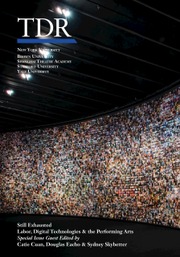No CrossRef data available.
Article contents
Vanity Monitor
Published online by Cambridge University Press: 01 December 2022
Abstract
The work of Brooklyn-based theatre company Fake Friends, always obsessed with screens, the self, and theatrical presence, gained a new following when they adapted their work for livestream during the Covid-19 pandemic. At the same time these adaptations, which transformed the company’s practice from “screens-on-stage” to “staged-for-screen,” reinvigorated debates around absence, presence, and alienation in the Zoom era.
- Type
- Yale TDR Consortium Issue
- Information
- Copyright
- © The Author(s), 2022. Published by Cambridge University Press for Tisch School of the Arts/NYU
References
References
Bailenson, Jeremy N. 2021. “Nonverbal Overload: A Theoretical Argument for the Causes of Zoom Fatigue.” Technology, Mind, and Behavior 2, 1. doi.org/10.1037/tmb0000030
CrossRefGoogle Scholar
Butler, Isaac. 2022. The Method: How the Twentieth Century Learned to Act. New York: Bloomsbury.Google Scholar
Cage, John. (1968) 2018. “Extract from ‘A year from Monday.’” In Cybernetic Serendipity: The Computer and the Arts, ed. Reichardt, Jasia, reprint of book edition, 24–25. London: Studio International.Google Scholar
Hadavas, Chloe. 2020. “Tired of Seeing Your Own Face on Zoom? Hide It.” Slate, 2 April. https://slate.com/technology/2020/04/how-to-hide-face-zoom.html
Google Scholar
Krauss, Rosalind. 1976. “Video: The Aesthetics of Narcissism.” October 1:50–64. doi.org/10.2307/778507
CrossRefGoogle Scholar
Jiang, Manyu. 2020. “The reason Zoom calls drain your energy.” BBC, 22 April. www.bbc.com/worklife/article/20200421-why-zoom-video-chats-are-so-exhausting
Google Scholar
Leonhard, Woody. 1995. The Underground Guide to Telecommuting: Slightly Askew Advice on Leaving the Rat Race Behind. New York: Addison-Wesley.Google Scholar
McLuhan, Marshall. 1964. Understanding Media: The Extensions of Man. New York: McGraw Hill.Google Scholar
Morrison, Toni. 2017. “The Work You Do, the Person You Are.” New Yorker, 29 May. www.newyorker.com/magazine/2017/06/05/the-work-you-do-the-person-you-are
Google Scholar
Mull, Amanda. 2020. “Americans Got Tired of Looking Bad on Zoom.” The Atlantic, 19 November. www.theatlantic.com/technology/archive/2020/11/ring-lights-for-all/617143/
Google Scholar
Wiener, Norbert. (1948) 1961. Cybernetics: Or, Control and Communication in the Animal and the Machine. Cambridge, MA: The MIT Press.Google Scholar
TDReading
Dixon, Steve. 2017. “Cybernetic-Existentialism and Being-towards-death in Contemporary Art and Performance.” TDR 61, 3 (T235):36–55. https://doi.org/10.1162/DRAM_a_00672
CrossRefGoogle Scholar


